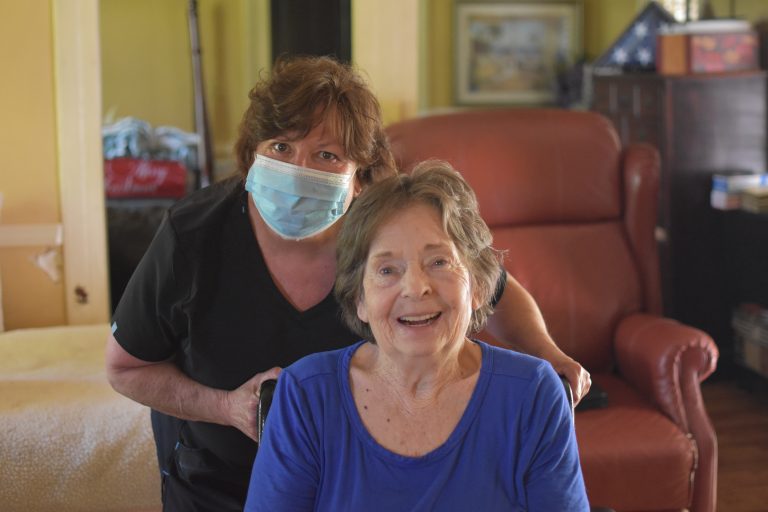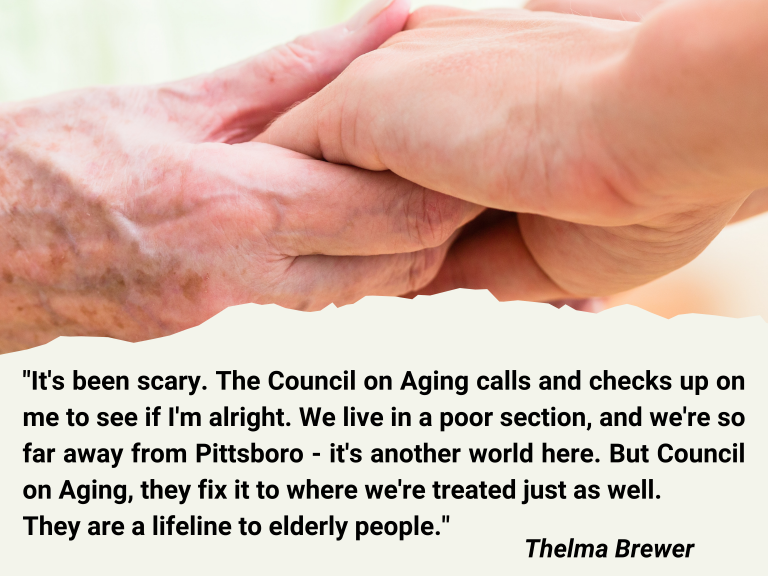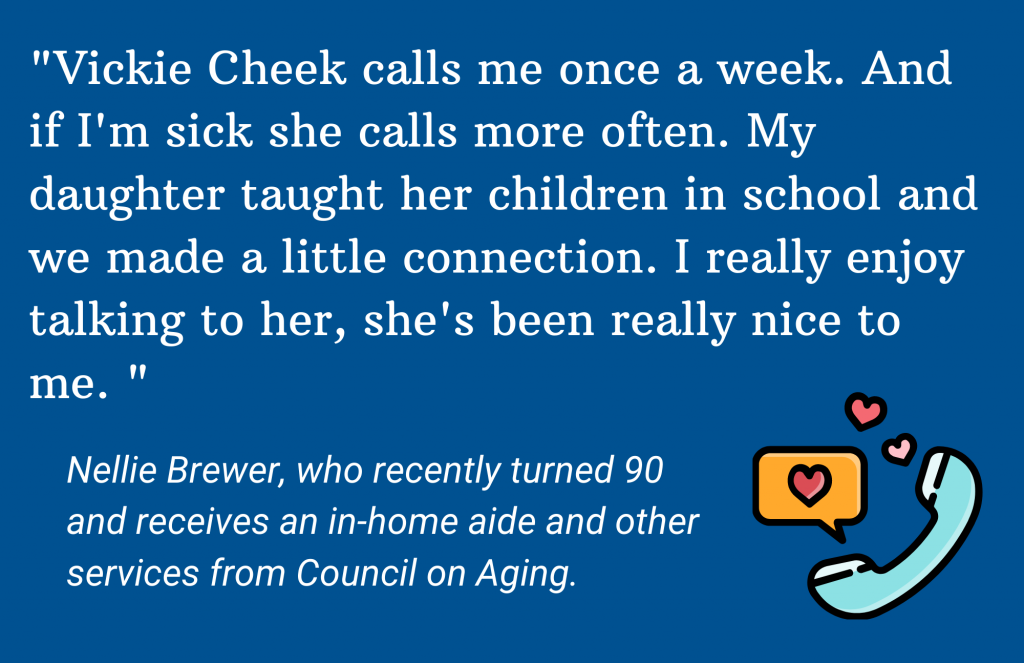
Council on Aging Builds Stronger Programs, Relationships and Community During Pandemic
Thelma Brewer has lived in a nineteenth century farmhouse in Bennett for over 35 years. She’ll be 81 in June and a series of strokes and falls have made her almost entirely homebound. The Chatham County Council on Aging has been an essential part of her everyday life for the past several years, particularly throughout the pandemic. Brewer has an in-home aide for two-and-a-half hours five days a week, receives a weekly “Friendly Phone Call” from Council on Aging staff, and also receives weekly shelf-stable meals. The Council on Aging even sends her a Chatham News + Record newspaper each week.
“That Vickie Cheek – she called me during COVID more than she called her own kids, I believe,” Brewer said of the Council on Aging’s Vickie Cheek. Cheek and many of the Council on Aging staff make weekly Friendly Phone Calls – something they say they look forward to about as much as their clients.
Serving Chatham County senior citizens for nearly 47 years, the Council on Aging has become a pandemic response powerhouse, shifting services and filling in the gaps, applying for grants and securing funding, while providing essential services to the senior citizens of Chatham County. Since the pandemic began, the Council on Aging has responded to more than 16,000 requests for information and requests for assistance, via phone calls, email and in-home visits. Despite the pandemic, the Council on Aging’s extensive list of programs and offerings to senior citizens only slightly changed.
“Very little went away,” said Dennis Streets, Executive Director of the Council on Aging. “We had to find other ways to make things happen. I don’t think we hardly stopped doing anything, and in some ways we’ve done even more. Our online wellness programming is an example of that.”


Chatham Community Comes Together to Provide Meals for Seniors
At the start of the pandemic, even before Chatham County saw its first positive cases of COVID-19, the Council on Aging (COA) had begun phone conversations and meetings with everyone receiving services. As initial health recommendations emerged, COA staff taught seniors how to sneeze into their elbows and to wash their hands while singing two rounds of “Happy Birthday,” and began discussing what their needs may be during the pandemic should they have to stay home.
Their doors closed March 16, 2020, with staff and a few volunteers coming in to help with meal delivery. They initially put their in-person congregate meals on hold at both the Eastern (Pittsboro) and Western (Siler City) Senior Centers. Soon after, to protect the safety of volunteers—many of whom are seniors themselves—the daily, volunteer-driven Meals on Wheels went on hold as well. Staff had to make changes to their meal delivery programs, immediately shifting to shelf-stable and frozen meal delivery.
Streets said COA was “proficiently proactive” and placed a large order of shelf-stable meals early into the pandemic before the meals became hard to find. In 2020 United Way of Chatham County awarded COA $9,000 through its COVID Relief Fund, which provided 2,960 shelf-stable meals, serving 195 individuals. Clients now have their choice of a box of shelf-stable meals, or frozen meals (from Asheboro’s Golden Corral).
“When I heard about the United Way COVID Relief Fund in May 2020, I was reluctant at first to request support because I knew many other local nonprofits were also struggling with the issues and needs presented by the pandemic,” Streets said. “Still, I was so pleased to learn we were awarded funds to support purchase of shelf-stable meals and other items to assist Chatham seniors sheltering in place.
“Nearly a year later, we have now served 128 new meals recipients in addition to those we already had enrolled in our nutrition program before the pandemic began.”
For the first month during the pandemic, meal deliveries were handled by volunteers – then other agencies stepped in, including the Chatham County Sheriff’s Office, Chatham County Manager’s Office, Emergency Management, the Chatham County Health Department, UNC Medical School, Siler City Pharmacy, Chatham Health Alliance, and Chatham County Parks and Recreation. The Chatham Agriculture and Conference Center provided storage space for the shelf-stable meals. Eventually the delivery assistance from those agencies was replaced via a partnership with Chatham Transit, which now delivers all meals, incontinence supplies, medical equipment, pet food and supplies, and fans (during summer months). COA has also worked closely with CORA Food Pantry during the pandemic, and CORA now delivers groceries to several COA clients.

Howard Alston works for Chatham Transit and has been delivering meals and supplies to seniors since Chatham Transit took over. He’s had the same route with the same seniors for about one year.
“I’ve always said, ‘Do unto others as you would want them to do unto you,’” Alston said. “A lot of (the seniors) are very, very, very kind and very glad to get their food. A lot of them are shut in and don’t have transportation.”
Alston said it is humbling to know that so many people take time to care for the seniors of Chatham County.
“A lot of times they are overlooked and not treated as part of society as they used to be,” he said. “It’s a joyful feeling when they come to the door and give you that smile.”
In-Home Aide and Caregiver Challenges
Prior to the pandemic, COA had five state-licensed home care agencies under contract. Soon after the pandemic struck, they added two more. COA currently provides personal in-home aide care to 62 seniors. Streets said their Board of Directors recently approved to continue with seven agencies this next fiscal year. Even with seven agencies, there is still a waiting list.
Vickie Cheek, COA’s Homebased Services Manager, said she calls each agency weekly to ask if aides are available.
“It remains very difficult to find an available aide when we get a new case,” Cheek said.
Cathy, the in-home aide for Thelma Brewer, works for First Choice, a company contracted by COA. She works 48 hours each week and has a total of five clients with COA. She said her clients have felt safe with her, but some of her clients’ family members didn’t always wear masks, and she ended up having to quarantine twice due to positive cases among clients’ family members.
COVID fears contributed to some seniors being completely alone in their homes.
“Close to 100 percent of the people who participated in my driveway visits in the fall and winter had no visitors – their children didn’t want to come around them because of COVID,” said Susan Hardy, Human Services Team Leader and Caregiver Specialist for COA. She does the initial intake for COA’s caregiver respite program, which also faces problems finding aide coverage.
“They are starving for people to interact with,” she said.
Hardy said COVID fears also caused some in-home aide clients to temporarily discontinue the program, with family or friends taking over and becoming the caregiver. Ironically, prior to COVID, a consumer-directed care program was in the works at COA – a program they implemented during the pandemic with the help of the Triangle J Council of Governments. Triangle J completely oversees the program, and Streets said a recently awarded grant will help pay for the program again this coming fiscal year.
The pandemic has also shed light on the need for caregiver respite, which is intermittent caregiver relief. Prior to COVID Hardy was in the final planning stages of a volunteer-based respite program – REST – Running Errands and Sleep Time. The program was to offer caregiver respite at 13 churches across Chatham, for four hours each week, allowing the caregiver to have time to themselves. Twenty volunteers had already been trained to help staff the churches, but the program had to be put on hold due to the pandemic. Hardy hopes it will begin by the end of 2021.
Another program of Hardy’s, a caregiver support group, had to go from in-person meetings to virtual. Prior to the pandemic caregivers would bring their loved ones to the senior center for activities, while the caregivers met and provided conversation and support to one another. The virtual support groups have been helpful, and Hardy now offers driveway visits. In addition, the Family Caregivers’ Support Group has recently resumed socially distanced in-person meetings on the porch of COA’s Eastern Center.
“A lot of caregivers need a break but are afraid of letting anyone into their homes,” she said. “They have been isolated with their loved ones without any help.”
COVID Vaccinations and Reopening Senior Centers
Streets said vaccine education and sign up was something that became a priority for the senior community once the vaccinations became available. COA worked closely with the Department of Public Health, and Public Health eventually allowed the COA to register people directly into their system. COA staff called everyone they served, helping family members navigate the vaccination rollout and signing up those who were homebound and had no one to help them. COA also helped arrange transportation through Chatham Transit to vaccination centers. In addition to continuing its support of transportation to medical appointments, the COA also began arranging transportation to pharmacies, grocery stores, banks, and other essential services.
Thelma Brewer said she was elated when vaccinations became available.
“When they got those shots this old woman was the first in line to get hers,” she said.
“They were afraid of COVID,” Cheek said of the seniors she spoke with. “They wanted to get out. They were so glad when they got the shot.”

Preparing for reopening, COA staff called 125 of their senior center congregate meal participants, and of the 100 who responded, 94 were already vaccinated.
“Having people fully vaccinated will make it much easier for us to reopen,” Streets said. “The vast majority of our participants say they really want folks to be vaccinated if they were to be at the senior center.”
Cheek said in speaking with her clients each day, she knows they are looking forward to returning to the senior centers.
“They need that interaction, and we had a great time up here,” she said. “They had a lunch bunch, would go on trips, play dominoes, exercise, eat… it’s a fellowship and it’s like a family. A lot of them have missed that and they are looking forward to coming back.”
This July, the vaccinated seniors of Chatham will hopefully be able to do just that. The COA’s 47th anniversary celebration will be a virtual event July 8, but Streets said he hopes to invite people back to the senior center for a hot meal. Because the Eastern (Pittsboro) Center will be undergoing renovations, COA will begin shuttling people from Pittsboro to the Western Center (Siler City). Occupancy numbers will be significantly reduced; however, staff is looking forward to having people back.
“Socialization is so big – a huge part of their well-being,” said Allison Andrews, COA’s Volunteer Coordinator. “We want them back at the centers.”
The pandemic has challenged COA staff, the COA Board of Directors, volunteers, and their community partners in many ways over the past year, and they are all in agreement the experience has made the agency stronger.
“I can’t think of enough adjectives to express my delight with the staff and people wanting to help – volunteers, the community partners… it’s been a team effort,” said Streets. “When you talk about faith in humankind, that’s what it is. People have really gone beyond the call of duty in terms of finding ways to help each other within our community. It’s gratifying. I’m blessed to work with an outstanding group of people.”
Friendly Phone Calls



United Way Support









